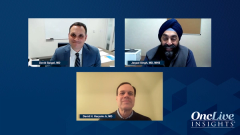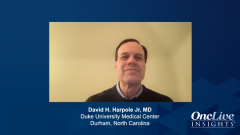
Adjuvant Therapy in Early Stage NSCLC
David Spigel, MD, and David H. Harpole Jr, MD, describe when adjuvant therapy is recommended in early stage NSCLC and discuss data from recent clinical trials of adjuvant therapy.
Episodes in this series

Transcript:
David Spigel, MD: Let’s talk about what we’re dealing with here. We have stage I adenocarcinoma. The surgical outcomes look good, it was a lobectomy, the margins [and nodes] were negative, and there were no other high-risk features. We presume the patient had a great recovery and there were no other suspicious findings. As we all know, in real life, the PET [positron emission tomography]–CT scan isn’t exactly perfect. There are always some other nodules or something else you’re trying to figure out if it is connected or not. So the patient comes in to see [one of us] and is saying, “What else do I need to do?” Dr Singh, maybe you don’t have adjuvant discussions, and you leave that to your radiation medical oncology colleagues, but it is your sense that this patient is done, or [do they] need other therapy?
Jaspal Singh, MD, MHS: There’s some variability here. Obviously, there are some data to suggest they might benefit from additional therapy, but for now, I think we’re still trying to figure this out. I think it’s an individualized discussion at this point. The fortunate part, which you mentioned earlier, [is that] the bronchoscopy now can get you enough tissue for molecular testing. We try to give that option. Should that patient opt to proceed with something systemic, I think we’ll have that option for them. I think the word is still out though. There are some data to suggest that this patient may be done, but there are some patients, high-risk patients for example, for whom the medical oncology community may say, “This patient really wants to try something additional.” I think we can get into that, and there’s a suggestion of some data to support that. But again, it’s an individual decision, and I don’t think there’s a universal solution quite yet.
David Spigel, MD: I think that’s fair. In some parts of the world, in Southeast Asian countries, there are some adjuvant recommendations for a 5-FU [5-fluorouracil]–based regimen in stage I cancer. In the United States, that has not really been adopted. In general, for smaller stage I cancers, we generally don’t recommend chemotherapy, although we have that conversation. The latest question that comes up is, is there a role for immune therapy or targeted therapy? Let’s start with EGFR because these are the more relevant things to discuss. David, to swing it back to you, are you getting EGFR mutation testing done on every patient you operate on regardless of anything else?
David H. Harpole Jr, MD: This particular case is an under-3-cm tumor with no high-risk features. I think most of us would not recommend adjuvant therapy, except on [a clinical] trial, for this patient. We are getting pretty much reflex testing of all of our resected patients. But if [a patient] is at a smaller center, for less than 3-cm lesions, it’s probably not unreasonable to hold back on that. I think all the information we can gain is important. God forbid, if this patient recurs, it would be nice to have had that information beforehand to help you, David, if you’re looking at a recurrence situation and what to do for next therapy.
David Spigel, MD: Yes, I think that’s well said. I’ll reference for our viewers [that] what Dr Harpole is alluding to is the ADAURA study. This is a trial that was trying to define the role of adjuvant EGFR TKI [tyrosine kinase inhibitor] therapy, osimertinib, in patients with EGFR mutations. To run through things quickly, this study took patients with stage I through stage III disease, but everybody had an EGFR mutation. Patients would get chemotherapy or not, according to their doctor’s preference. It was a global study, and so there were a lot of patients with stage III cancer who didn’t get adjuvant chemotherapy. Everybody was randomized to osimertinib or not. The trial had a disease-free survival [DFS] end point, and you stayed on osimertinib for 3 years.
The trial demonstrated a DFS advantage in favor of osimertinib, and osimertinib was FDA approved in the United States for adjuvant use, but there are a couple of caveats. No. 1 is we’re waiting on overall survival data. No. 2, remember that chemotherapy was optional. The FDA approval was really for stage II and stage IIIA disease. If you go to the New England [Journal of Medicine] paper and you go to the appendix, there’s a nice graph of the different stages and the DFS for each of those stages [of cancer], even though for the overall intent-to-treat [population], the primary end point was in stage II and stage III. There is an advantage that is demonstrated for stage I cancers for osimertinib vs not, but not powered enough to be in the intent to treat—it was not a primary end point, so it was a secondary end point mixed in with all the other stage II and stage III patients.
So, what to do? For patients in front of you in the office, the textbook technical answer is there’s no indication for adjuvant osimertinib in stage I cancer. However, I still have the conversation with the patient. I let them know what the trial showed and didn’t show, and what the FDA approved. I’ve had some patients say they want to do it. I’ve had a couple pursue it, and of course, I helped them pursue that, and we were able to get it. It’s outside the label, it’s not indicated, but if you have a conversation with the patient, [it may be] still what they want to do.
Transcript edited for clarity.





































